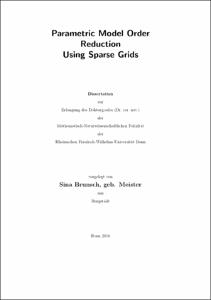Brunsch, Sina: Parametric Model Order Reduction Using Sparse Grids. - Bonn, 2017. - Dissertation, Rheinische Friedrich-Wilhelms-Universität Bonn.
Online-Ausgabe in bonndoc: https://nbn-resolving.org/urn:nbn:de:hbz:5n-48165
Online-Ausgabe in bonndoc: https://nbn-resolving.org/urn:nbn:de:hbz:5n-48165
@phdthesis{handle:20.500.11811/7247,
urn: https://nbn-resolving.org/urn:nbn:de:hbz:5n-48165,
author = {{Sina Brunsch}},
title = {Parametric Model Order Reduction Using Sparse Grids},
school = {Rheinische Friedrich-Wilhelms-Universität Bonn},
year = 2017,
month = sep,
note = {In applications such as very large scale integration chip design models are typically huge. The same is true in mechanical engineering, especially when the models are complex finite element discretizations. To speed up simulations the large full order model is replaced by a smaller reduced order model. This is called model order reduction. The challenge is to find a reduced order model that closely resembles the full order model in order not to lose too much accuracy.
Many models depend on parameters. The goal of parametric model order reduction is to preserve this dependence in the reduced order model to avoid repeatedly performing time-consuming model order reduction for every new parameter value. This is particularly interesting for parameter studies.
In this thesis we develop, analyze and test a parametric model order reduction method for large symmetric linear time-invariant dynamical systems which preserves stability and is efficient in higher-dimensional parameter spaces. This method is based on sparse grid interpolation. In a pre-computation step, local reduced order models are computed at several discrete points in parameter space. Whenever we need to evaluate the model at an arbitrary point in parameter space, a reduced order model at that point is obtained by interpolating the system matrices of the local reduced order models on matrix manifolds.
As a theoretical foundation we introduce appropriate norms for parametric models and state conditions for the parameter dependence such that these norms are finite. In our analysis we then derive an upper bound for the interpolation error expressed in these norms, which shows a good qualitative behavior in computational experiments.
We demonstrate that interpolation on sparse grids is more efficient than interpolation on full grids and that interpolation with global polynomial basis functions is more efficient than interpolation with piece-wise linear basis functions when the parameter dependence is smooth. Furthermore, we consider a benchmark studied in a recent parametric model order reduction method comparison survey and show that parametric model order reduction methods based on matrix interpolation can be competitive to other methods when exploiting the symmetry of that system.},
url = {https://hdl.handle.net/20.500.11811/7247}
}
urn: https://nbn-resolving.org/urn:nbn:de:hbz:5n-48165,
author = {{Sina Brunsch}},
title = {Parametric Model Order Reduction Using Sparse Grids},
school = {Rheinische Friedrich-Wilhelms-Universität Bonn},
year = 2017,
month = sep,
note = {In applications such as very large scale integration chip design models are typically huge. The same is true in mechanical engineering, especially when the models are complex finite element discretizations. To speed up simulations the large full order model is replaced by a smaller reduced order model. This is called model order reduction. The challenge is to find a reduced order model that closely resembles the full order model in order not to lose too much accuracy.
Many models depend on parameters. The goal of parametric model order reduction is to preserve this dependence in the reduced order model to avoid repeatedly performing time-consuming model order reduction for every new parameter value. This is particularly interesting for parameter studies.
In this thesis we develop, analyze and test a parametric model order reduction method for large symmetric linear time-invariant dynamical systems which preserves stability and is efficient in higher-dimensional parameter spaces. This method is based on sparse grid interpolation. In a pre-computation step, local reduced order models are computed at several discrete points in parameter space. Whenever we need to evaluate the model at an arbitrary point in parameter space, a reduced order model at that point is obtained by interpolating the system matrices of the local reduced order models on matrix manifolds.
As a theoretical foundation we introduce appropriate norms for parametric models and state conditions for the parameter dependence such that these norms are finite. In our analysis we then derive an upper bound for the interpolation error expressed in these norms, which shows a good qualitative behavior in computational experiments.
We demonstrate that interpolation on sparse grids is more efficient than interpolation on full grids and that interpolation with global polynomial basis functions is more efficient than interpolation with piece-wise linear basis functions when the parameter dependence is smooth. Furthermore, we consider a benchmark studied in a recent parametric model order reduction method comparison survey and show that parametric model order reduction methods based on matrix interpolation can be competitive to other methods when exploiting the symmetry of that system.},
url = {https://hdl.handle.net/20.500.11811/7247}
}






